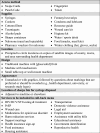Discreet but accessible: a qualitative study with people who use drugs and service staff about the optimal design of a harm reduction vending machine in rural Kentucky
- PMID: 40426237
- PMCID: PMC12117748
- DOI: 10.1186/s12954-025-01222-y
Discreet but accessible: a qualitative study with people who use drugs and service staff about the optimal design of a harm reduction vending machine in rural Kentucky
Abstract
Background: Rural Appalachia has been significantly affected by drug-related harms (Hepatitis C, HIV, overdose deaths) over the past two decades, but harm reduction responses still lag behind other regions. Harm reduction vending machines (HRVMs) are an effective intervention for preventing overdose and the spread of infection, though they are newer to the US and have rarely scaled out to rural areas. Here, we report on guidance from people who use drugs (PWUD) and health department staff on how to adapt HRVMs to suit local needs in rural Appalachian Kentucky.
Methods: Focus groups were conducted with local health department and syringe service program (SSP) staff, PWUD who use the SSP, and PWUD who do not use the SSP. The interview guide covered key HRVM features including identification for access, contents, location, and appearance. Focus groups were recorded and transcribed, and data thematically analyzed.
Results: The results yielded 3 major themes: participants sought an HRVM that was discreet and nonjudgmental, accessible and equitable, and holistic. These themes informed their decisions when ranking features of the machine's location, content, appearance, etc. Focus groups favored discreet machines that were out of plain sight; placing the machine somewhere walkable to ensure it is accessible; and including items that address needs beyond harm reduction to give participants more holistic help.
Conclusions: HRVM scale out in this rural area should be guided by discreet and non-judgmental approaches that create an accessible and equitable machine that responds holistically to community needs. Future efforts to scale out HRVMs into rural areas could use this guidance as a starting point for exploring local priorities, to help ensure successful implementation in under-served rural areas.
© 2025. The Author(s).
Conflict of interest statement
Declarations. Competing interests: The device to facilitate syringe disposal and dispensing that will be installed in conjunction with the kiosk is intellectual property of the University of Kentucky, with AMY designated as the inventor.
Figures
Similar articles
-
Likelihood of using a harm reduction vending machine among rural people who inject drugs in Appalachian Kentucky.Int J Drug Policy. 2025 Mar;137:104709. doi: 10.1016/j.drugpo.2025.104709. Epub 2025 Jan 21. Int J Drug Policy. 2025. PMID: 39842394
-
Comparing Harm Reduction Vending Machines and In-Person Overdose Prevention Services in Practice: A Case Study From Rhode Island.J Public Health Manag Pract. 2025 Jul-Aug 01;31(4):574-584. doi: 10.1097/PHH.0000000000002128. Epub 2025 Feb 18. J Public Health Manag Pract. 2025. PMID: 39964190 Free PMC article.
-
Lessons Learned Implementing Syringe Services Programs at Rural Health Departments in Kentucky.AIDS Behav. 2024 Sep;28(9):3051-3059. doi: 10.1007/s10461-024-04389-w. Epub 2024 Jul 13. AIDS Behav. 2024. PMID: 39001946
-
A scoping review of implementation considerations for harm reduction vending machines.Harm Reduct J. 2023 Mar 16;20(1):33. doi: 10.1186/s12954-023-00765-2. Harm Reduct J. 2023. PMID: 36927354 Free PMC article.
-
Lessons learned from the Amsterdam Cohort Studies among people who use drugs: a historical perspective.Harm Reduct J. 2021 Jan 6;18(1):2. doi: 10.1186/s12954-020-00444-6. Harm Reduct J. 2021. PMID: 33407562 Free PMC article. Review.
References
-
- Adam MB, Minyenya-Njuguna J, Kamiru WK, Mbugua S, Makobu NW, Donelson AJ. Implementation research and human-centred design: how theory driven human-centred design can sustain trust in complex health systems, support measurement and drive sustained community health volunteer engagement. Health Policy Plan. 2020;35(2):150–62. 10.1093/heapol/czaa129. - PMC - PubMed
-
- Associated Press Latin America. PR group tests syringe vending machine for addicts. PR Group Tests Syringe Vending Machine For Addicts. 2009
MeSH terms
Grants and funding
LinkOut - more resources
Full Text Sources
Miscellaneous


